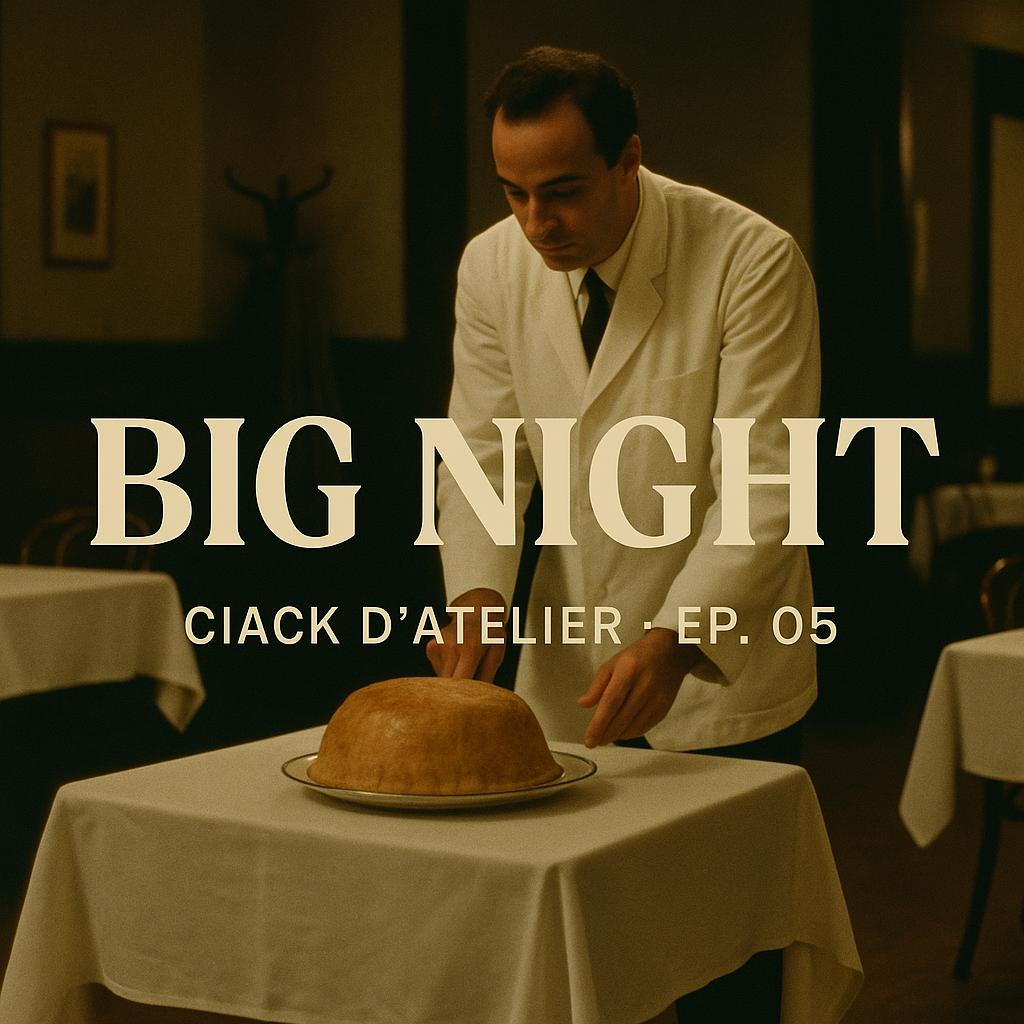“Big Night”: When Food Becomes Vanishing Art
This week on Ciack d’Atelier, Charlotte Madeleine Castelli dives into the poetic depths of Big Night (1996), a cinematic gem where cuisine meets high art. Through the sculptural elegance of the timpano and the quiet failure of two Italian brothers in 1950s America, the film reveals a tender, sacred portrait of artistic integrity in a world obsessed with spectacle. A story where the most powerful expression is silence—and the most beautiful creation is the one no one sees.
CIACK D'ATELIER
Charlotte Madeleine CASTELLI
7/13/20253 min read


When food becomes a work of art destined for silence. The Timpano, the Ephemeral Sculpture, and the Art No One Sees.
Every now and then, a film appears on screen that doesn’t merely tell a story:it slow-cooks it. It extracts the essence, lets it simmer quietly, and then serves it without explanation, with the timid elegance of someone who knows they’ve created something beautiful even if no one will notice. Big Night (1996), directed by Stanley Tucci and Campbell Scott, is one of those films, a work that doesn’t need to shout to be remembered, that turns art into an act of faith, and the kitchen into an intimate, fragile, and powerful altar.
There is a scene that burns in the memory like a relic: The timpano. A dish that feels almost mythological, architectural, solemn. When Primo, the chef-artist played by Tony Shalhoub, prepares it, he does so like a sculptor working with a living material. Every layer, every filling, every fold of the pasta is a plastic gesture, a composition, a harmony. It’s not just a dish: it’s an ephemeral sculpture, a monument destined to vanish the very moment it reaches perfection. The timpano is the invisible heart of Big Night. It’s the culinary equivalent of a site-specific artwork: conceived for one evening, one audience, one unrepeatable occasion. It is an act of love, utterly useless and utterly complete, that only a true artist can perform without expecting anything in return.
Few people know that the recipe used in the film is authentic, passed down from Stanley Tucci’s own family. It was his Calabrian grandmother’s celebratory dish, prepared only for rare, extraordinary occasion, Christmas, weddings, and anniversaries: the word “timpano” was not chosen at random: it refers to the eardrum, the vibrating membrane that perceives sound. A poetic way of saying that this dish, like art, must be “listened to” with the whole body. For the film’s central scene, five identical timpani were made, to allow the ritual of the slicing to be filmed from multiple angles without interruption. Every time, the same silence was observed: the kind of silence that sanctifies more than any line of dialogue ever could.
The brothers’ restaurant, “Paradise,” is not a restaurant. It is a hidden art gallery, tucked into a provincial American town that only wants spaghetti and entertainment. Like many alternative art spaces, it exists on the margins, resisting conformity, offering a beauty that goes unrecognized. Primo’s kitchen isn’t meant to sell, it’s meant to create. It’s not business; it’s identity. Secondo, played by Tucci himself, is the other side of the coin: the mediator, the curator perhaps, trying to balance between art and market, between the absolute and the sustainable. But Big Night is a film where compromise fails. And precisely for this reason, it becomes poetry.
The screenplay, which took years to refine, was conceived as a love letter to artistic failure, inspired by real Italian restaurants in 1950s America that were crushed under the weight of inauthentic trends and diluted flavors. The two brothers aren’t just chefs—they’re misunderstood artists, like painters exhibiting abstract canvases in a town that only wants pastoral landscapes. In a world ruled by Pascal, the other restaurateur and embodiment of commercial success, authenticity does not pay. Refined taste, slowness, dedication, silence—these are not currency. And yet, in their resistance lies the film’s true light. In their failure that becomes ritual, in the perfect dinner that does not save the restaurant but saves their dignity as creators, the film quietly explodes.
That “big night” dinner is a masterpiece no one will recognize. An unrepeatable performance. But it is in the final scene, silent, motionless, without music, that the film becomes sacred. Primo rises early, cracks an egg, cooks a frittata for his brother. No words. No redemption. Just a gesture. And in that gesture, in that shared frittata, all the art that remains is revealed. The full truth of the human being who creates, fails, and loves. The stove becomes both a stage and a confessional; silence, the curtain that falls on something eternal.
Another rarely known detail: that frittata was prepared in real time by Tucci, in a single take and without rehearsal. The slow movements, the uncertain hands, the knife that divides—none of it was scripted. It was alive. No instructions were given for the final moment: the silence was spontaneous, a choice born within the scene itself, as happens in the best theatre improvisations.
Big Night doesn’t simply tell the story of a dinner. It is a meditation on beauty that does not save, on art that does not serve, but exists anyway. Like a one-night-only exhibition. Like a work created knowing it will never be seen. Like the true heart of every artist: silent, stubborn, irreducible.
For this Sunday, let the taste linger.... and let that timpano, long since vanished, live on in memory, like all great works of art.
With dedication for Ciack d’Atelier ... where cinema and art sit at the same table.
© Charlotte Madeleine Castelli | All rights reserved
